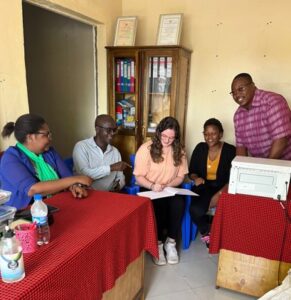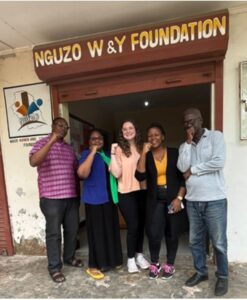Jambo from Tanzania!
My name is Kelsey Cohn and I am a Master of Public Health candidate in the Global Health concentration at UNC Chapel Hill. I am working with Nguzo Women and Youth Foundation, located in Bombang’ombe in the Hai District of Tanzania, to fulfill my practicum requirements, but my intentions span far beyond checking a box!
You may have heard the phrase “Global is local, and local is global.” Why travel to another country when you can support your own community? I grappled with this concept for several months as I networked to find my practicum.
The responsibility of ethical participation in the decolonization of global health and discomfort from history are the fundamental reasons I chose to pursue a practicum in a different country. The first step in doing so was establishing the content of the practicum itself. I collaborated with the founder of the organization to inquire about Nguzo’s primary needs, identified ways that I could produce quality work for each of those needs, modified proposed solutions based on the organization’s feedback, and asked the founder to identify which solutions the team would like me to provide.
As I sat in the Nairobi airport during my 13.5 hour layover, I prepared myself mentally for the application of my global health skills that I have been working so intently to build throughout my first year of my MPH. I realized the next step in ethical engagement involved ensuring that I reflected upon my intentions. So I got out my journal and wrote until my hand hurt. I realized that it is not unethical to have personal growth objectives, as long as my primary mindset is supporting the organization and community in pre-existing efforts, and I live in such a way that I humbly contribute meaningfully and sustainably without exploiting any aspect of the community or experience. I would be lying if I said I was not nervous about making mistakes, but Gillings prepared me to ask for feedback early and often to ensure that I am on the right track and not creating new problems or participating in historic oppressive global health actions.
Where there is discomfort, there is an opportunity to recognize bias, beliefs, norms, inequality, injustice, and the reality of differing access to resources. Awareness is not enough, but introspection and a conscious choice to make changes within oneself and taking humble, community-led action is a vital part of facilitating peaceful, responsible, equitable, and sustainable global health work.
Now to the engaging on-site part:
I arrived in Moshi at the end of May and took a few days to adjust before starting my first week in the office. My host family greeted me at the airport and was enthusiastic about helping me orient myself to the culture, customs, public transportation, and layout of the town. The Nguzo Women and Youth Foundation team welcomed me and made it clear that I was genuinely a member of the team and assured me that I would not be treated as a tourist.


Nguzo partners with fourteen primary schools and three secondary schools in the Hai and Siha Districts of the Kilimanjaro region, along with several local organizations. Their programs include the following areas: reproductive health; Adolescent Sexual and Reproductive Health (ASRH); Water, Sanitation, and Hygiene (WASH); mental health; inclusion of differently abled children; entrepreneurship; Community Empowerment Programs (CEP); environment and climate change; and outbreak response. Nguzo works with children and women, who the organization chose to describe as female-presenting parents and guardians of the children.
We began preparing for World Menstrual Hygiene Day by composing hygiene kits for differently abled youth attending Kibaoni Primary School in the Hai District. The boys’ kits were composed of combs, mirrors, soap, and socks. The girls received similar kits that also contained razors and reusable pads that can be washed and last for four years. Nguzo educated the mothers of the children on usage of the pads and healthy hygiene practices. Menstrual stigma and a lack of resources for managing menstruation at a young age in schools often results in a sentiment of shame and embarrassment, which has led to many young girls dropping out of school. The distribution of hygiene kits is one of the core initiatives that Nguzo facilitates to ensure sustainability, inclusion, education, and equipping students with tools they need to stay in school and develop a strong education that provides a promising vocational outlook.
While the team facilitated the intervention in Kiswahili, the founder asked me to take photos and videos of the event. I was aware of ethical photography conceptually and had pondered this intensely before the event, but I was nervous about whether I was going to make an unethical mistake. The first part came naturally: I did not take out my camera until the team introduced me and explained to all of the mothers that they had asked me to capture content to support Nguzo’s online presence and ability to fundraise. The team then asked for consent and if anyone was uncomfortable with photos being taken. I tried my best to stay out of the way, prevent distraction from the program, and stayed vigilant for anyone who showed signs of being uncomfortable with photography. I consulted with the team to ensure that all content they desired was captured.
I began my next task, which was developing the website. The founder provided me with all the information and the vision of the website. I worked with her to translate testimonies from two mothers that attended the Menstrual Hygiene Day event, which proved to be quite challenging and required close collaboration. These can be found on Nguzo’s website (nguzofoundation.org) if you are interested in watching them! I also am working on maintaining and expanding their social media presence. They can now be found on YouTube and LinkedIn, as well as their pre-existing Facebook and Instagram profiles.
I want to ensure that everything I contribute towards Nguzo will be sustainable. To be certain this intention is met, I decided to develop a maintenance guide for the website with detailed explanations on modifying the format and information. The guide also includes details for managing various social media platforms and methods of content creation to support future community engagement, partnership building, fundraising, and recruitment. As I develop content, I also occasionally demonstrate the skills live so that the team members can feel confident in replicating them in the future without disrupting their workflow.
The team has expressed heartfelt gratitude for what my collaboration means for the organization. As they seek funding, volunteers, staff, and partnerships, it is essential to have a strong website and expansive social media that can be referenced, especially for background checks and to prove the organization actually exists. I am thrilled to have the opportunity to support Nguzo in their growth and maintenance of life-changing initiatives.
If you are interested in learning more about Nguzo Women and Youth Foundation and/or supporting their initiatives, please take a browse through their shiny, new website at nguzofoundation.org.
Asante sana! (Thank you!)
Kelsey Cohn
